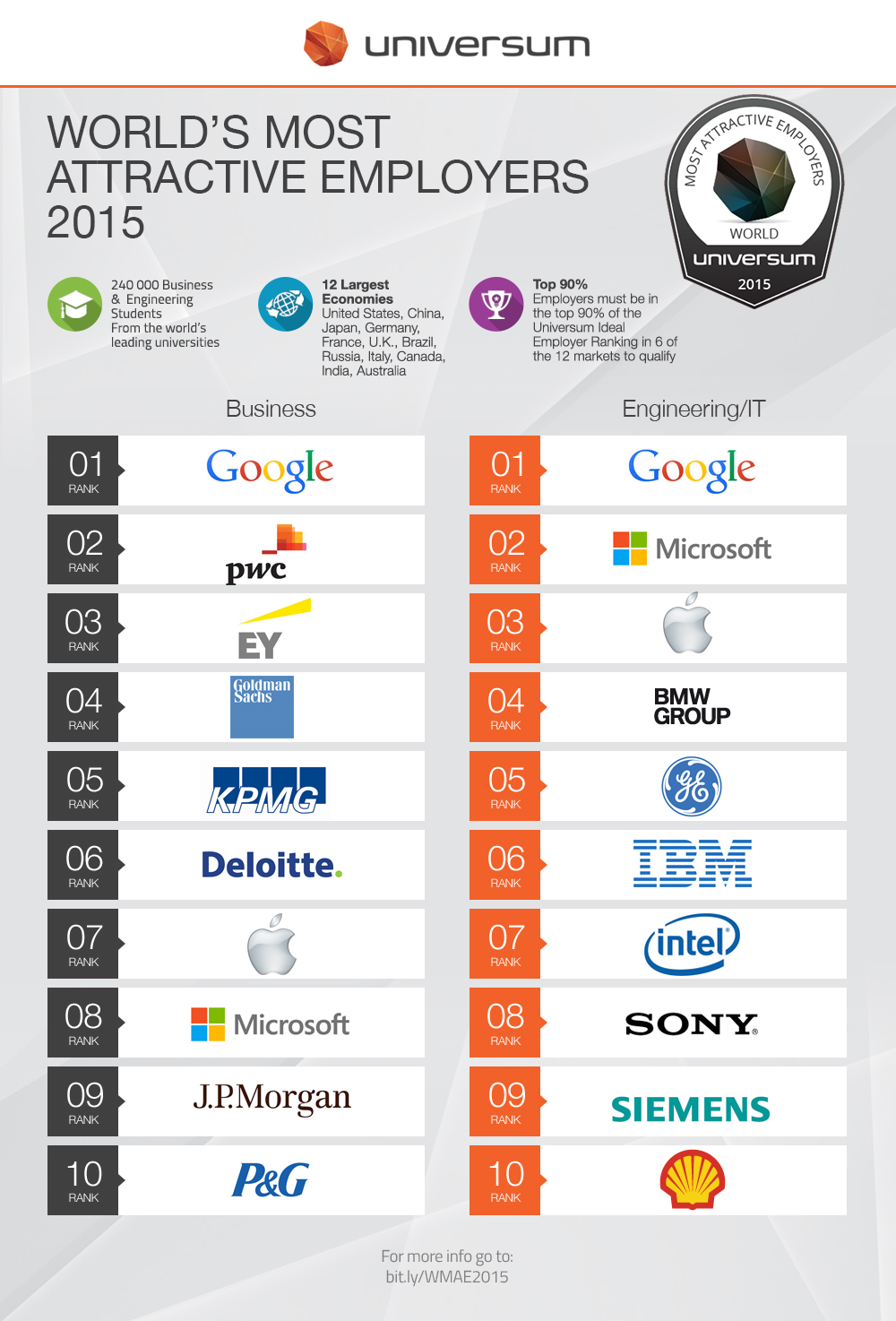How to Be One of the World’s Most Attractive Employers

But what makes an organization the “World’s Most Attractive Employer”? How do you reach that level?
According to Universum’s latest study, we should be asking those questions of Google — after all, Google topped Universum’s lists of the 10 most attractive employers in the world for both business and engineering/IT students.
Before exploring the study any further, I feel the need to point out that it isn’t perfect. Universum surveyed 240,000 people from 12 countries across the world, which seems like an excellent sample size, but consider this: Universum only surveyed millennials — particularly millennials who were enrolled in business or engineering/IT programs at universities.
So, Universum didn’t really discover the world’s most attractive employers; what the company really discovered was the world’s most attractive employers in the eyes of millennial business or engineering/IT students.
That being said, I do think Universum’s study is worth delving into. It may not be perfect, but it can help us get a better feel for what a specific set of workers is looking for in an employer — and some of the lessons we walk away with may be applicable to other segments of the workforce.
Now that all the disclaimers are out of the way, let’s take a look at the results:

While Melissa Murray Bailey, president of Universum Americas, wasn’t shocked to see any of the names on these lists per se, she did express surprise at “the diversity of companies and industries that are attractive to both business and engineering students.”
“This could be a sign that skills, not majors, are helping to dictate the career paths for these students,” Murray Bailey says. “Employers and talent are taking broader approaches as they think about their careers, which is already starting to have some interesting implications for how employers brand themselves.”
Speaking of broader approaches, what unites the employers on these lists? What common traits do they share with one another? Murray Bailey names three:
1.These Companies Emphasize Purpose Over Products
“Millennials want to be part of a cause and know how their work fits into the bigger picture,” Murray Bailey says. “The companies that emphasize that tend to be successful with this group.”
Universum’s study notes that this means millennials are not wooed by “traditional trappings like compensation or name recognition.” Instead, millennials are more interested in things like “friendly work environments” (about 40 percent of the students surveyed named this a “key consideration”).
2.Top-Ranked Companies Place a High Emphasis on Innovation
The employers on this list don’t just talk the talk when it comes to creativity — they truly walk the walk.
“It’s one thing to throw around buzzwords like ‘innovation’; it’s something entirely different to live and breathe it every day,” Murray Bailey says.
The study found that 45 percent of business students and 49 percent of engineering/IT students valued “creative and dynamic work environments,” which speaks to just how important innovation is to millennials.
3. At These Companies, Learning Outpaces External Change
“The world is moving at an incredibly fast pace, and in order to keep up, organizations need to be flexible enough to adapt and grow faster than that pace,” Murray Bailey says.
Millennials really appreciate when organizations prioritize the learning and development of their employees: 44 percent of business students and 42 percent of engineering/IT students said they were looking for employers that offer “training and development.”
Universum’s study also found that students placed a premium on job security and stability, which contradicts the popular picture of millennials as restless job hoppers. Universum found that 47 percent of business students and 46 percent of engineering/IT students valued security and stability in their jobs.
“Millennials have a reputation for jumping around from job to job, but I’m not sure that this is always a symptom of ‘career restlessness,'” Murray Bailey says. “I think the tendency to change jobs can come from a mismatch between expectations and reality. For employers, setting realistic expectations at the outset and being really clear about what your work environment is really like might be able to help with millennial retention.”
And that’s why I think this study is valuable: if employers want to retain millennials, they need to set realistic expectations. Employers need to know what millennials are looking for in their careers, and they need to be upfront and honest with millennials about whether or not they can meet these expectations.
Of course, millennials are just as diverse as any generation before them, and the business/engineering/IT students surveyed here don’t speak for all of Generation Y. But Universum’s study does offer one perspective on what makes employers attractive, and that perspective could help your business recruit and retain the talent it needs.

